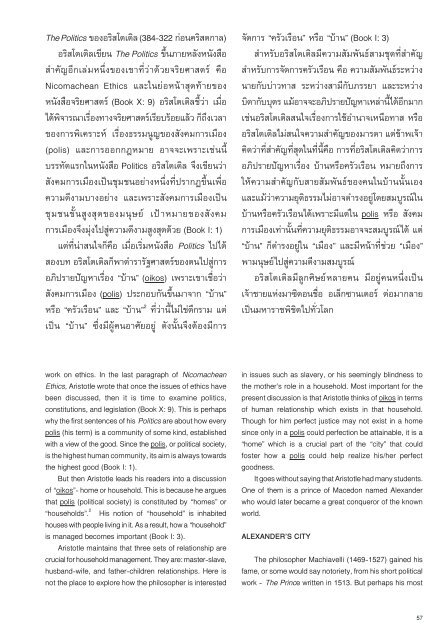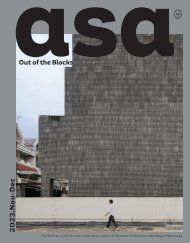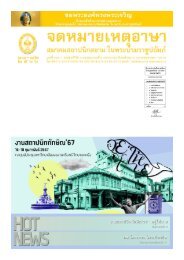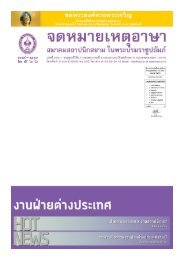บ้านเรือนถิ่นไทยในช่วงเจ็ดทศวรรษ 2489-2559
You also want an ePaper? Increase the reach of your titles
YUMPU automatically turns print PDFs into web optimized ePapers that Google loves.
The Politics ของอริสโตเติล (384-322 ก่อนคริสตกาล)<br />
อริสโตเติลเขียน The Politics ขึ้นภายหลังหนังสือ<br />
สำคัญอีกเล่มหนึ่งของเขาที่ว่าด้วยจริยศาสตร์ คือ<br />
Nicomachean Ethics และในย่อหน้าสุดท้ายของ<br />
หนังสือจริยศาสตร์ (Book X: 9) อริสโตเติลชี้ว่า เมื่อ<br />
ได้พิจารณาเรื่องทางจริยศาสตร์เรียบร้อยแล้ว ก็ถึงเวลา<br />
ของการพิเคราะห์ เรื่องธรรมนูญของสังคมการเมือง<br />
(polis) และการออกกฎหมาย อาจจะเพราะเช่นนี้<br />
บรรทัดแรกในหนังสือ Politics อริสโตเติล จึงเขียนว่า<br />
สังคมการเมืองเป็นชุมชนอย่างหนึ่งที่ปรากฏขึ้นเพื่อ<br />
ความดีงามบางอย่าง และเพราะสังคมการเมืองเป็น<br />
ชุมชนขั้นสูงสุดของมนุษย์ เป้าหมายของสังคม<br />
การเมืองจึงมุ่งไปสู่ความดีงามสูงสุดด้วย (Book I: 1)<br />
แต่ที่น่าสนใจก็คือ เมื่อเริ่มหนังสือ Politics ไปได้<br />
สองบท อริสโตเติลก็พาตำรารัฐศาสตร์ของตนไปสู่การ<br />
อภิปรายปัญหาเรื่อง “บ้าน” (oikos) เพราะเขาเชื่อว่า<br />
สังคมการเมือง (polis) ประกอบกันขึ้นมาจาก “บ้าน”<br />
หรือ “ครัวเรือน” และ “บ้าน” 2 ที่ว่านี้ไม่ใช่ตึกราม แต่<br />
เป็น “บ้าน” ซึ่งมีผู้คนอาศัยอยู่ ดังนั้นจึงต้องมีการ<br />
จัดการ “ครัวเรือน” หรือ “บ้าน” (Book I: 3)<br />
สำหรับอริสโตเติลมีความสัมพันธ์สามชุดที่สำคัญ<br />
สำหรับการจัดการครัวเรือน คือ ความสัมพันธ์ระหว่าง<br />
นายกับบ่าวทาส ระหว่างสามีกับภรรยา และระหว่าง<br />
บิดากับบุตร แม้อาจจะอภิปรายปัญหาเหล่านี้ได้อีกมาก<br />
เช่นอริสโตเติลสนใจเรื่องการใช้อำนาจเหนือทาส หรือ<br />
อริสโตเติลไม่สนใจความสำคัญของมารดา แต่ข้าพเจ้า<br />
คิดว่าที่สำคัญที่สุดในที่นี้คือ การที่อริสโตเติลคิดว่าการ<br />
อภิปรายปัญหาเรื่อง บ้านหรือครัวเรือน หมายถึงการ<br />
ให้ความสำคัญกับสายสัมพันธ์ของคนในบ้านนั้นเอง<br />
และแม้ว่าความยุติธรรมไม่อาจดำรงอยู่โดยสมบูรณ์ใน<br />
บ้านหรือครัวเรือนได้เพราะมีแต่ใน polis หรือ สังคม<br />
การเมืองเท่านั้นที่ความยุติธรรมอาจจะสมบูรณ์ได้ แต่<br />
“บ้าน” ก็ดำรงอยู่ใน “เมือง” และมีหน้าที่ช่วย “เมือง”<br />
พามนุษย์ไปสู่ความดีงามสมบูรณ์<br />
อริสโตเติลมีลูกศิษย์หลายคน มีอยู่คนหนึ่งเป็น<br />
เจ้าชายแห่งมาซิดอนชื่อ อเล็กซานเดอร์ ต่อมากลาย<br />
เป็นมหาราชพิชิตไปทั่วโลก<br />
work on ethics. In the last paragraph of Nicomachean<br />
Ethics, Aristotle wrote that once the issues of ethics have<br />
been discussed, then it is time to examine politics,<br />
constitutions, and legislation (Book X: 9). This is perhaps<br />
why the first sentences of his Politics are about how every<br />
polis (his term) is a community of some kind, established<br />
with a view of the good. Since the polis, or political society,<br />
is the highest human community, its aim is always towards<br />
the highest good (Book I: 1).<br />
But then Aristotle leads his readers into a discussion<br />
of “oikos”- home or household. This is because he argues<br />
that polis (political society) is constituted by “homes” or<br />
“households”. 2 His notion of “household” is inhabited<br />
houses with people living in it. As a result, how a “household”<br />
is managed becomes important (Book I: 3).<br />
Aristotle maintains that three sets of relationship are<br />
crucial for household management. They are: master-slave,<br />
husband-wife, and father-children relationships. Here is<br />
not the place to explore how the philosopher is interested<br />
in issues such as slavery, or his seemingly blindness to<br />
the mother’s role in a household. Most important for the<br />
present discussion is that Aristotle thinks of oikos in terms<br />
of human relationship which exists in that household.<br />
Though for him perfect justice may not exist in a home<br />
since only in a polis could perfection be attainable, it is a<br />
“home” which is a crucial part of the “city” that could<br />
foster how a polis could help realize his/her perfect<br />
goodness.<br />
It goes without saying that Aristotle had many students.<br />
One of them is a prince of Macedon named Alexander<br />
who would later became a great conqueror of the known<br />
world.<br />
ALEXANDER’S CITY<br />
The philosopher Machiavelli (1469-1527) gained his<br />
fame, or some would say notoriety, from his short political<br />
work - The Prince written in 1513. But perhaps his most<br />
57


















